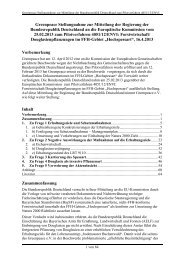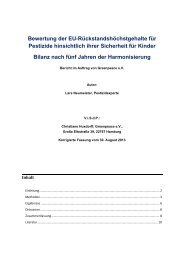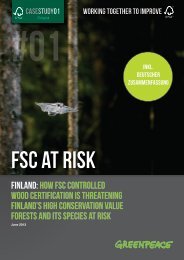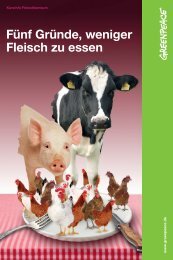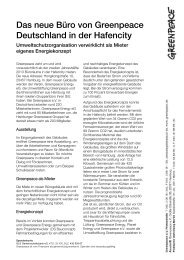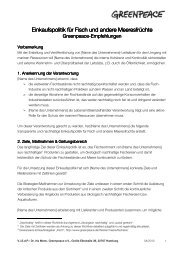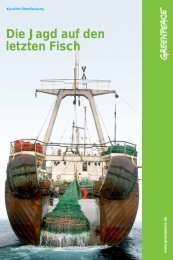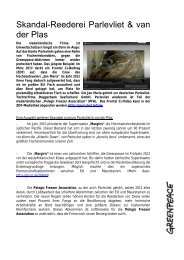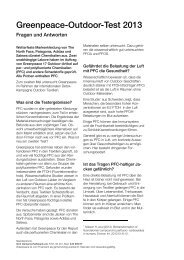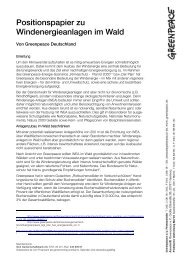Untitled - Greenpeace
Untitled - Greenpeace
Untitled - Greenpeace
Create successful ePaper yourself
Turn your PDF publications into a flip-book with our unique Google optimized e-Paper software.
52<br />
CARVING UP THE CONGO<br />
©<strong>Greenpeace</strong>/Reynaers<br />
‘The Bank’s actions in the DRC<br />
industrial timber sector are<br />
subject to some criticism. …<br />
[T]here are serious ethical<br />
considerations because there<br />
is little doubt that local<br />
populations will be victimised<br />
by industrialised logging.’ 300<br />
Theodore Trefon, 2006<br />
‘The conditions under which cahiers des<br />
charges are negotiated often do not enable<br />
communities to adequately express and defend<br />
their rights. In the case of Trans-M, the<br />
company held one meeting with the<br />
customary landowners (les ayants droits) and<br />
the village chief (chef du village) to announce<br />
that it would start working in the community.<br />
The company then returned for a second<br />
meeting, with the Government’s advisor, and<br />
demanded that the community draft its<br />
priorities and demands for the cahier des<br />
charges and sign the document that same day<br />
(February 2005). After more than a year, none<br />
of the commitments made by the company in<br />
the cahier des charges … has been fulfilled. The<br />
villagers complained: “We asked them to<br />
provide us with enough wood for our coffins<br />
and they even refused that.”’ 301<br />
As the BIC/ED report also emphasises, the<br />
existence of a social responsibility contract<br />
does not obviate the need for direct<br />
compensation for the losses communities<br />
experience as a result of forest destruction<br />
from industrial logging. These losses can<br />
include, amongst others, a decline in the<br />
supply of or access to non-timber forest<br />
products on which communities depend,<br />
including mushrooms, caterpillars and forest<br />
animals that are hunted.<br />
Local communities that depend on the forest<br />
currently being logged by Trans-M have<br />
complained that the company is cutting down<br />
sapele trees (see p 46). Communities rely on<br />
these trees for caterpillars, an important<br />
source of protein and cash in an area that<br />
otherwise suffers from malnutrition. Further,<br />
Trans-M’s logging operations overlap with,<br />
and threaten to damage, areas used by<br />
communities for small-scale agriculture. 302<br />
On 19 February 2005, Trans-M also obtained<br />
an agreement from several neighbouring<br />
communities. 303 The negotiations over this<br />
created considerable conflict; younger people<br />
felt that elders had failed to look after the<br />
long-term interests of the community. The<br />
deal also created tensions between<br />
communities, with some customary<br />
landowners refusing to sign the social<br />
responsibility contract because they felt the<br />
content was weak and that their needs were<br />
not adequately taken into account.



